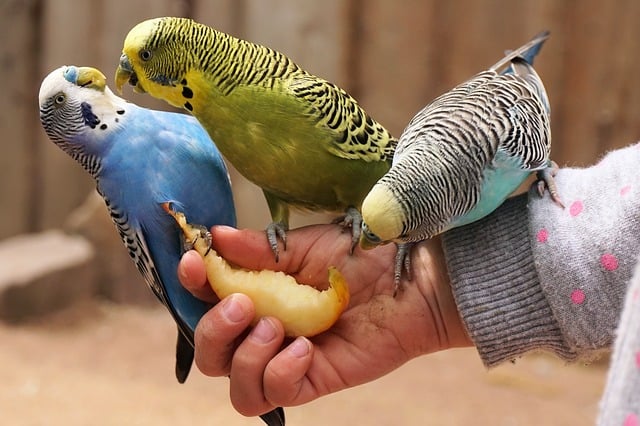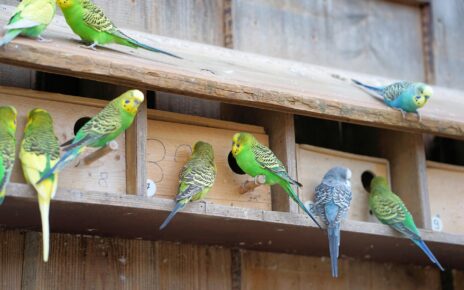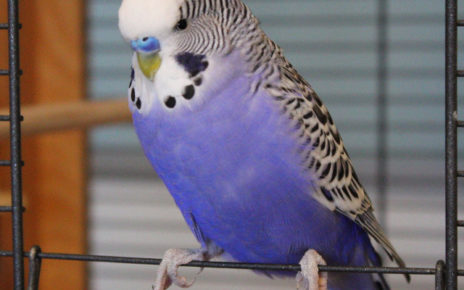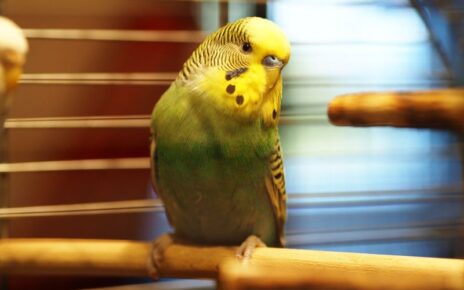To better understand if a parakeet can eat fruit, it’s good to know what they eat in the wild. Parakeets in their native habitat of Australia, mostly eat fresh greens, seeds and berries.
In the wild a parakeet will have limited access to certain types of food depending on the season. Greens are usually available throughout the year, while seeds and berries are only plentiful for limited time periods.
In the wild parakeets do eat small amounts of fruit, and they primarily eat small wild berries. For a pet parakeet this means that they can be given fruit sparingly as a treat. But the majority of their diet should be made up of a well rounded bird food, and fresh greens for added nutrition.
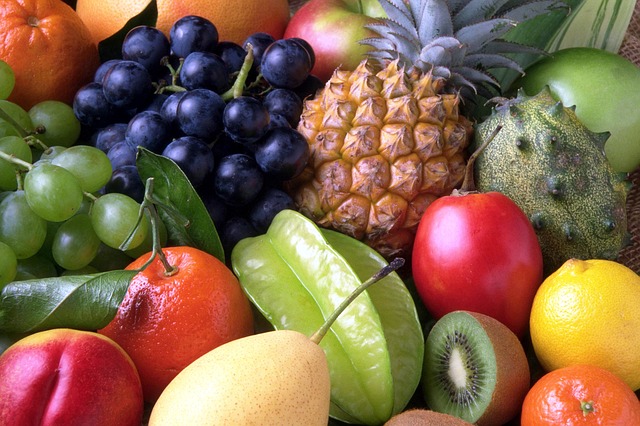
Fruit is great if you want to add some variety to a parakeets diet, and it’s also a good source of vitamins and minerals. Some of the important vitamins in fruits are vitamin C, A and K. Fruits also tend to be rich in minerals like potassium and magnesium.
While most fruits are safe for a parakeet to eat, there are some fruits you should avoid. In addition, some fruits that are safe for a parakeet will still need to be prepared properly for your parakeets health and safety.
When you feed your parakeets fresh fruit, care should be taken not to let the fruit sit in their cage for too long. Fruit that is allowed to sit for a long period could potentially make a parakeet sick, and the fruit could attract fruit flies as it starts to spoil.
Here is a complete list of the most common fruits most people ask if they can feed to their parakeet.
Can Parakeets Eat Apples?
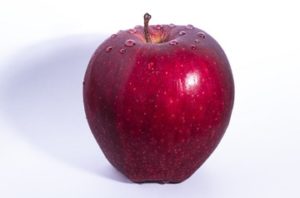
Yes, parakeets can eat apples and most parakeets tend to like them. Even though apples are a safe fruit to feed a parakeet, they do need to be served properly so they don’t cause any harm.
Never feed a parakeet an apple with seeds still in it. Apple seeds are poisonous to parakeets, due to the fact that they contain amygdalin, a compound that converts into cyanide once it enters a parakeets intestines. Apples should also be cut into small enough pieces, so they can be easily eaten by a parakeet.
Can Parakeets Eat Avocado?
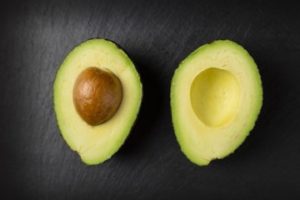
No, Parakeets should never eat avocados, the skin, seeds and to a lesser extent flesh, are all toxic to most bird species, and this includes parakeets. The symptoms of avocado poisoning a parakeet might experience are cardiac arrhythmia followed by eventual heart failure. The safest thing you can do for your parakeet is to never feed them avocados.
Can Parakeets Eat Bananas?
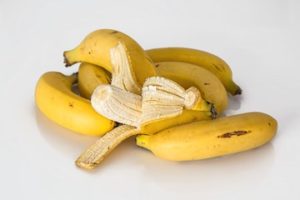
Yes, Parakeets can eat bananas and they make a quick treat, and they are usually readily available. The best part about bananas is how easy they are to prepare for a parakeet. All you have to do is peel off the skin and it’s ready to eat.
Since bananas are seedless there is no risk of the bird eating a poisonous seed. A whole banana will usually be a little too much for a single parakeet, if that’s the case you can break the banana up into smaller pieces in order to make it easier to manage.
Can Parakeets Eat Blackberries?
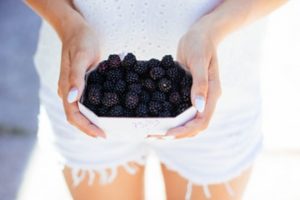
Yes, Parakeets can eat blackberries, and since they relatively small berries they closely replicate a parakeets native diet. Blackberries are a perfect bite sized fruit to feed a parakeet, and they require little to no preparation. Even though blackberries do contain seeds they are of no risk to birds, and will usually just pass right through their system.
The only concern when feeding blackberries to parakeets, is that their droppings will be more likely to cause stains. If the bird is in their cage this shouldn’t be a problem, but if they are outside of their cage, and they like to perch on furniture this could be a problem.
Can Parakeets Eat Blueberries ?
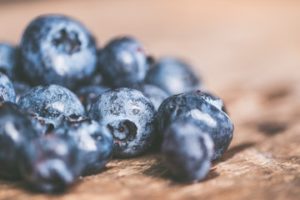
Yes, Parakeets love to eat blueberries. Blueberries are one of the best berries to feed a parakeet. One reason they are one of the best fruits for parakeets is their size. Since blueberries are such a small berry most parakeets will be able to easily fit them in their beak.
Blueberries are also very healthy, since they have very good vitamin C content, and they have very high antioxidant levels. Tthe seeds found in blueberries are also extremely small, and they should’t cause any digestive problems for your parakeet.
Can Parakeets Eat Cantaloupe?
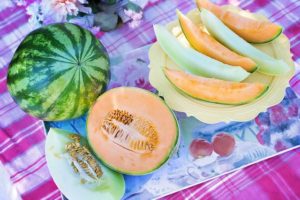
Yes, Parakeets can eat cantaloupe. Cantaloupe is a very nutritious fruit that is very rich in vitamin C and vitamin A. Obviously there will be some prep work when it comes to feeding your parakeet cantaloupe.
A cantaloupe needs to be cut open and the seeds have to be removed before feeding it to your parakeet. Cantaloupe seeds are actually not poisonous, but it’s safer to remove them since they could still pose a choking hazard. Then all you have to do is cut the cantaloupe up into small pieces so they are easy to eat, and then let your parakeet enjoy them.
Can Parakeets Eat Cherries?
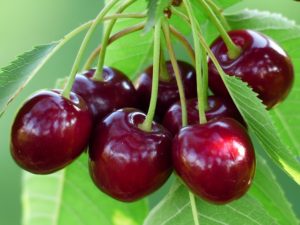
Yes, Parakeets can eat cherries and they make a quick and easy treat to prepare for a parakeet. Cherries are also a good source of potassium, copper, vitamin A along with antioxidants such as lutein, zeaxanthin, and anthocyanin glycosides.
Preparing cherries for your parakeet couldn’t be easier, as long as they are pitted. If you purchase unpitted cherries make sure to remove the pits since they are toxic, and they can pose a serious choking hazard
You can feed cherries to your parakeet whole as long as they are small enough to fit their beak. If you notice your parakeet is having a trouble handling a larger cherry try breaking it up into smaller pieces so it is easier for them to swallow .
Can Parakeets Eat Dried Fruit?
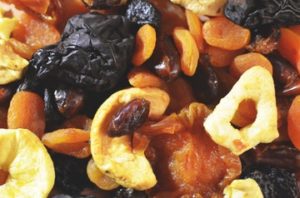
No and Yes, Parakeets may be fed dried fruit but this comes with a few caveats. While it might seem strange, that if a fruit is safe to eat fresh then why isn’t it safe when its dried.
It all comes down to how dried fruits are prepared. In order for dried fruit to have a long shelf life, they are usually coated with sulfur to prevent the growth of mold and bacteria . And while humans can handle eating sulfur most birds can not.
If you purchase dried fruit that is not treated with sulfur, and the fruit itself is safe to eat, then you can feed it to your parakeet.
There are also specially made dried fruits (Buy Online) just for birds available in pet stores and online. Just remember to always be careful and read the label first before feeding dried fruit to your parakeets. If you want you can even dry some fruit for your parakeet yourself if you have a dehydrator.
Can Parakeets Eat Grapefruit?
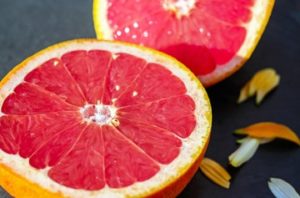
Yes, Parakeets can eat grapefruit. Like most citrus fruits grapefruits will serve as a good source vitamin C, and they also contain a wide rand of phytonutrients.
Preparing a grapefruit for a parakeet is a pretty simple task, first you’ll need to cut open the grapefruit and remove the flesh. The skin of a grapefruit should not be fed to a parakeet since it is quite tough and might pose a choking hazard.
All of the seeds should be removed from the grapefruit prior to feeding it to your parakeet. Grapefruit seeds can be poisonous since they do contain cyanide forming compounds. After the grapefruit is prepared just remove the individual pieces from the skin and then let your birds enjoy it.
Can Parakeets Eat Grapes?
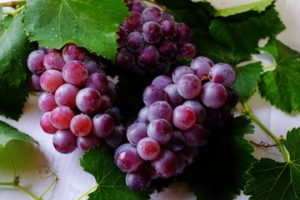
Yes, Parakeets can eat grapes and most parakeets absolutely love them. Grapes are also a good source of vitamin K and copper for your parakeet. Preparing grapes couldn’t be easier, as long as they are the seedless. All you’ll have to do is pop some of them off the branch, or hang a bunch right in your parakeets cage.
As long as the grapes are small enough to fit in your parakeets mouth, they should eat them right up. If you notice the parakeets having a hard time fitting the grapes in their mouth, try squishing them or finding a smaller variety of grapes.
Can Parakeets Eat Mandarin Oranges?
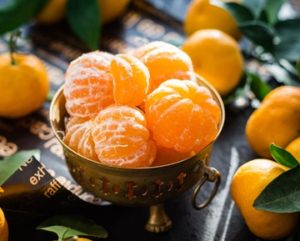
Yes, Parakeets can eat mandarin oranges. As with most citrus fruits they are safe to eat and are a very good source a vitamin C. Preparation of mandarin oranges entails peeling the orange and discarding the skin. Even though mandarin orange peels are not poisonous you should avoid feeding them to your parakeet.
Once the mandarin orange is peeled separate the pieces of the orange and remove all the seeds. Mandarin orange seeds should never be fed to a parakeet since they contain cyanide producing compounds. Once the mandarin orange is ready, break it into small enough pieces for your birds and then let them have it.
Can parakeets Eat Mango?
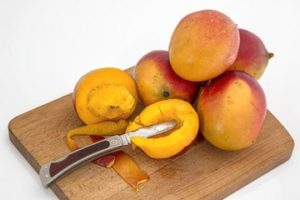
Yes, Parakeets can eat mango. Feeding your parakeet mango will provide them with plenty of vitamin C and vitamin A. Preparing mango for your parakeet is pretty straight forward. First you need to cut open the mango and remove the pit. Mango pits are not poisonous, but they are rather large, so it’s usually best to remove them before serving them to your parakeet. Once the pit is removed cut the mango into bite sized cubes, and then serve them up to your parakeet.
Can Parakeets Eat Oranges?
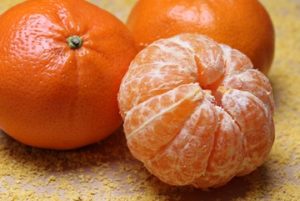
Yes, Parakeets can eat oranges. Since oranges are one of most popular citrus fruits they are cheap and readily available. That makes them a great fruit to keep on hand as a snack for a parakeet.
In order to prepare an orange for your parakeet, you’ll first need to peel the skin from the orange and discard it. While the skin is not poisonous it could pose a choking hazard. After that separate the pieces of the orange and carefully remove any seeds.
Orange seeds can cause cyanide to form inside a parakeets intestines, and should never be fed to your parakeet. Once the orange has been properly prepared, you can further break them apart into bit sized chunks and then feed them to your parakeets.
Can Parakeets Eat Peaches?
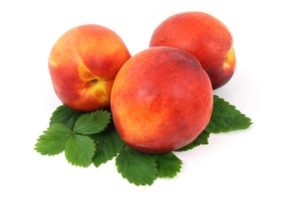
Yes, Parakeets can eat peaches. Feeding parakeets peaches is a great way to add vitamin A and vitamin C to their diet. Peaches are relatively easy to prepare for a parakeet.
Start by cutting open the peach, then remove the pit since the pit is toxic to parakeets. Peach pits contain a high levels of cyanide forming compounds, so they should never be fed to a parakeet. You should chop the peach up into small pieces so they are small enough to fit into your parakeets mouth, and then they can serve it up and let them to enjoy it.
Can Parakeets Eat Pears?
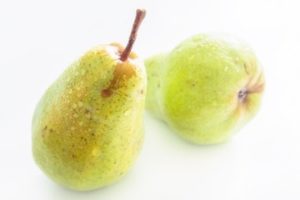
Yes, Parakeets can eat Pears. Pears are a great fruit since they will provide some much needed fiber to your parakeets diet. Ripe Pears are also a good source of vitamin C.
Pears are a relatively easy fruit to prepare. First the skin should be removed from the fruit, since it can be a little tough for your parakeet to digest. Secondly, all of the seeds should be removed, since they are poisonous if they are ingested by your parakeet. Then to make the pear a little easier to eat you’ll want to chop it up into bite sized pieces, and then you can serve it to your parakeet.
Can Parakeets Eat Pineapple?
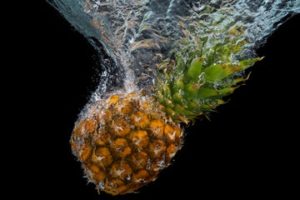
Yes, Parakeets can eat pineapple. This tropical fruit will add a nice touch of variety to your parakeets diet. Pineapples are also a very good source of vitamin C, and B vitamins.
Preparing a pineapple for your parakeet won’t be that different from preparing one for a human. First remove the tough outer skin from the pineapple. Then proceed to chop the pineapple up into bite sized pieces. After that it is just a matter of giving your parakeets as much pineapple as they can eat in one sitting.
Can Parakeets Eat Plums?
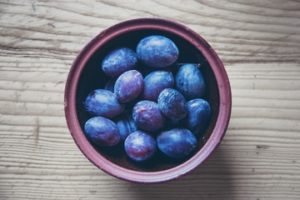
Yes, Parakeets can eat Plums. Plums are a very nutritious and they are readily available in most supermarkets. Plums will also serve as a good source of vitamin C, and soluble fiber. When preparing plums the only thing you will have to worry about is the pit.
Plum pits are very poisonous since they contain compounds the can transform into cyanide in your parakeets intestines. Once the pit is removed, all you will have to do is chop the plum up into small pieces and serve it to your parakeet.
Can Parakeets Eat Strawberries?
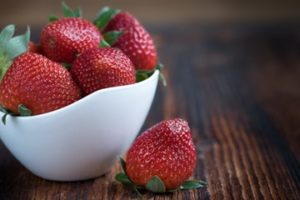
Yes, Parakeets can eat strawberries. Parakeets love strawberries just like they love most types of berries. Strawberries are also a very rich source of vitamin C and folic acid. Strawberries require very minimal preparation, depending on their size you can either chop them up or feed them directly to your parakeet.
Since strawberries tend to be a very soft fruit, even large strawberries should be easy for a parakeet to eat. And you won’t have to worry about the seeds since they are very small and will easily pass through your parakeets intestines.
Can Parakeets Eat Tomatoes?
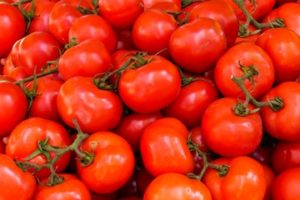
No, Parakeets shouldn’t eat tomatoes. Even though it might be possible to feed your parakeet small amounts of tomato it’s best to avoid it.
Tomato plants are a member of the very poisonous night shade family of plants. All parts of the plant contain a toxic chemical called tomatine. This chemical is concentrated mostly in the leaves and stems but it’s also present in the fruit.
The tomatine concentration in the fruit is much lower than the rest of the plant, which is why tomatoes are safe for humans to eat. But when it comes to other animals like parakeets it is better to be safe than sorry.
If a parakeet does eat a small amount of tomato it shouldn’t cause any serious problems. The real problem would be feeding large amounts of tomato to a parakeet on a regular basis. This could lead to a build up of the tomatine toxin, which could lead to some serious health problems. So for the safety of your parakeet it’s best just to avoid tomatoes all together.
Can Parakeets Eat Watermelon?
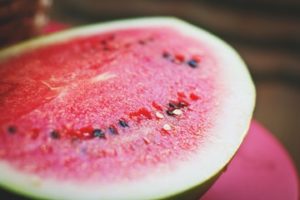
Yes, Parakeets can eat watermelon. If you have some extra watermelon from your summer parties you can definitely share some with your parakeet. Watermelons are a good source of vitamin C and lycopene.
When you prepare a watermelon for your parakeet the only major concern is the seeds. Even though watermelon seed are not poisonous, they can still pose a chocking hazard. If you have a seedless water melon then you won’t even have to worry about that at all. Once all the seeds have been removed simply chop the watermelon up into small pieces and serve it to your parakeet.
[yasr_overall_rating size=”medium”]

